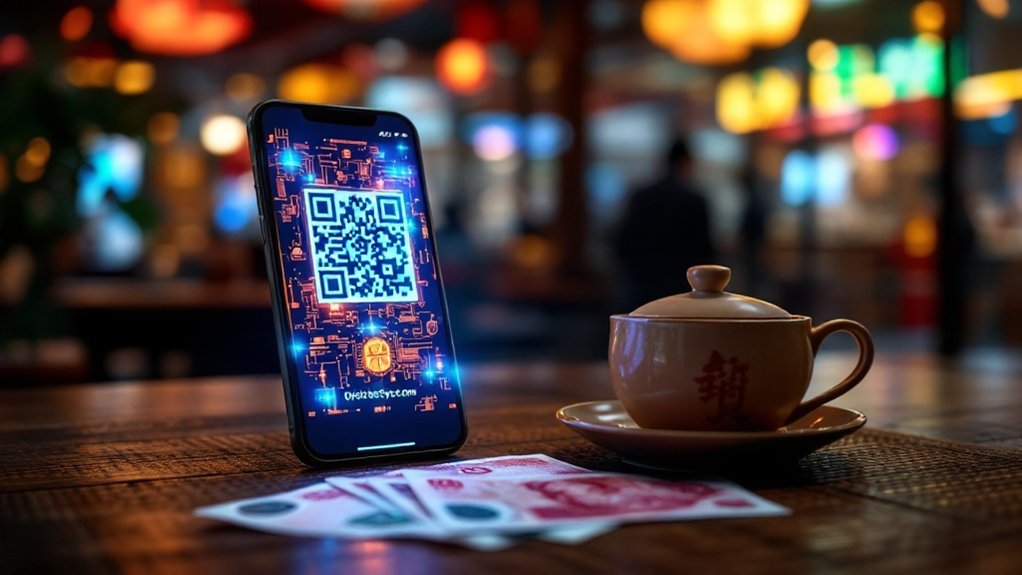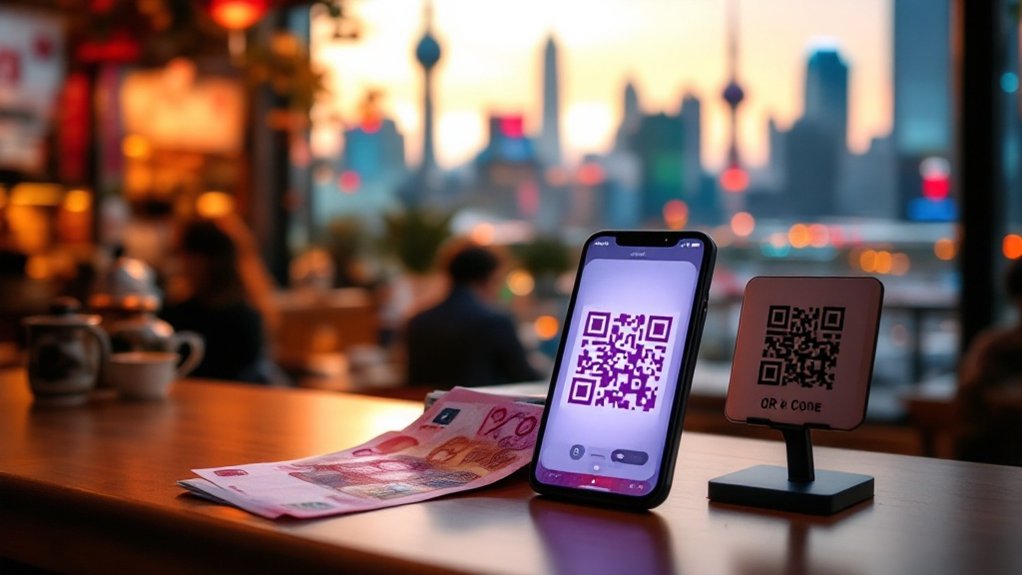In China, cash is old news. WeChat Pay and Alipay dominate everything. Visitors should download these apps before arrival and link them to international credit cards. QR codes are king—scan to pay for literally anything from street food to subway tickets. Carry some emergency cash (¥500-¥1000), especially for rural areas where digital options might be spotty. Locals might roll their eyes at paper money. The rest of this guide breaks down the essentials.

While travelers might assume cash is king worldwide, China's payment landscape has evolved rapidly into a digital-first economy. Forget your wallet. Seriously. The days of fumbling with yuan notes are practically ancient history here. Mobile payments dominate everything, with WeChat Pay and Alipay leading the charge. Cash? Still technically accepted by law. Will you get eye-rolls trying to use it? Absolutely. Content optimization tools have revolutionized how payment systems are marketed to international users.
Cash is so 2010. In China's digital kingdom, your smartphone isn't just useful—it's essential.
Setting up these mobile payment systems isn't the bureaucratic nightmare you might expect. Both WeChat Pay and Alipay can be linked to international credit cards. No Chinese ID needed for small transactions. Just download the apps before arrival—trust us on this one. You'll need them the second you land. QR codes are everywhere. They're not just trendy graphics; they're how transactions happen. The data integration process ensures seamless connectivity between international and local payment systems.
WeChat Pay does more than handle your coffee purchase. It's a messaging app, social media platform, and payment system rolled into one digital powerhouse. Alipay, meanwhile, integrates seamlessly with the Alibaba ecosystem. Shopping on Taobao? You'll need it. Both offer multiple languages and travel-friendly features. Convenience at its finest.
Bank cards exist in China, sure. UnionPay is widespread. But cards are primarily for high-end establishments or linking to your mobile payment apps. ATMs? They're around for cash withdrawals, but increasingly irrelevant in daily life. China skipped the card revolution and leaped straight to mobile.
E-commerce is booming, with Taobao and JD.com dominating online shopping. Mobile payments make checkout ridiculously simple. The user-friendly gateways work well even for foreigners. Travelers should consider carrying ¥500-¥1000 as emergency cash when venturing into rural areas. Some international e-wallets are accepted by merchants, but they're not nearly as prevalent. Using either payment method requires internet access, typically through a Chinese SIM card or reliable Wi-Fi connection.
The shift might seem jarring. A country where even street food vendors prefer digital payments? It's real. And efficient. Carry some cash for emergencies or rural areas, but prepare to pay like the locals do—with your phone.
Welcome to China's cashless revolution. It's not the future. It's now.
Frequently Asked Questions
Can I Use My Foreign Credit Cards in Rural China?
Foreign credit cards are rarely accepted in rural China. Period. The infrastructure just isn't there. Merchants outside major cities don't bother with them – too expensive, too complicated.
Cash is king in these areas, where even locals might not use cards. Mobile payments dominate, but foreigners face hurdles setting those up.
Some tourist spots might take major cards, but don't count on it. Better carry yuan.
What's the Minimum Transaction Amount for Wechat Pay?
WeChat Pay doesn't specify a minimum transaction amount for domestic payments in China.
Yes, seriously. No lower limit. Users can make purchases of any size, even tiny amounts like ¥1 (about $0.14). That's why it's so popular for small daily transactions.
For cross-border payments, limits focus on maximums rather than minimums – ¥50,000 daily and ¥200,000 annually.
Foreign cards may have their own restrictions, though.
Are There Daily Spending Limits on Digital Payment Platforms?
Yes, China's digital payment platforms enforce daily limits. Alipay and WeChat Pay cap transactions at 5,000 yuan without additional verification.
Extensive accounts with full identity verification allow up to 200,000 yuan annually.
Foreign visitors face different constraints—single transactions up to $5,000, capped at $50,000 yearly.
The People's Bank of China oversees these limits.
Everyone's restricted, locals and tourists alike. No exceptions.
That's China's financial control system for you.
How Do I Report Suspicious Payment Activity in China?
Reporting suspicious payments in China? Not rocket science.
Financial institutions handle most reporting automatically. Individuals can contact their bank or payment platform directly.
The People's Bank of China requires suspicious transactions be reported within 5 business days. For serious concerns, local police stations accept reports too.
China takes financial crimes seriously – penalties for non-compliance are steep. No exceptions, no excuses.
Can Tourists Receive Digital Payment Refunds After Leaving China?
Tourists generally cannot receive digital payment refunds after leaving China. The system isn't built for that.
Tax refunds? Different story. Those must be processed before departure, typically at the airport.
WeChat's digital VAT refund system at Beijing Capital International Airport requires tourists to complete all paperwork before exiting the country.
Once you're gone, you're out of luck. No exceptions. The digital economy moves fast in China, but some rules are absolute.




